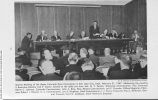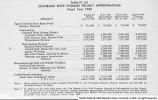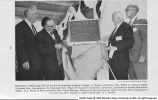| OCR Text |
Show The National Water Commission Bill The so-called National Water Commission Bill, H. R. 1458, was introduced in the House by Congressman Wyatt of Oregon on January 10, 1967. A companion Bill, S. 20, was introduced in the Senate on January 11, 1967 by Senator Jackson of Washington. According to their titles the purpose of these Bills is "To provide for a comprehensive review of national water resource problems and programs, and for other purposes." The most outstanding feature of the proposal is the creation of a National Water Commission to perform the reviews to be authorized. Similar Bills were introduced and the Senate held hearings on S. 20 in the 89th Congress. Title II of H. R. 3300 (Aspinall) of the 90th Congress, First Session, also contained language under which a National Water Commission would be created. Without further hearings in the 90th Congress, S. 20 was reported to the Senate without amendment on February 2, 1967 and passed by the Senate, without amendment, on February 6, 1967. As noted under the discussion of H. R. 3300, hearings were held in the House by the Subcommittee on Irrigation and Reclamation on S. 20 simultaneously with the hearings on H. R. 3300. The House Subcommittee amended S. 20 and reported it to the full Committee on June 8, 1967. On June 21, 1967 the full Committee reported the amended Bill to the House of Representatives. The House passed S. 20 with amendments on July 12, 1967. The principal differences between the Senate and House versions of S. 20 are: (1) Under the Senate Bill the seven members of the National Water Commission would be appointed by the President with the advice and consent of the Senate. The House eliminated the reference to approval by the Senate. (2) The Senate-passed Bill provided that the executive director of the National Water Commission be appointed by the chairman of the commission with the approval of the President and at a salary of level IV of the Federal Executive salary schedule. The House version of the Bill provided for appointment of the executive director by the chairman with the approval of the commission at a rate of pay to be determined by the U. S. Civil Service Commission. (3) The House eliminated from the Bill the limitation on payment of compensation to more than five persons at a rate established for grade 18 of the General Schedule. 76 |































































































































































